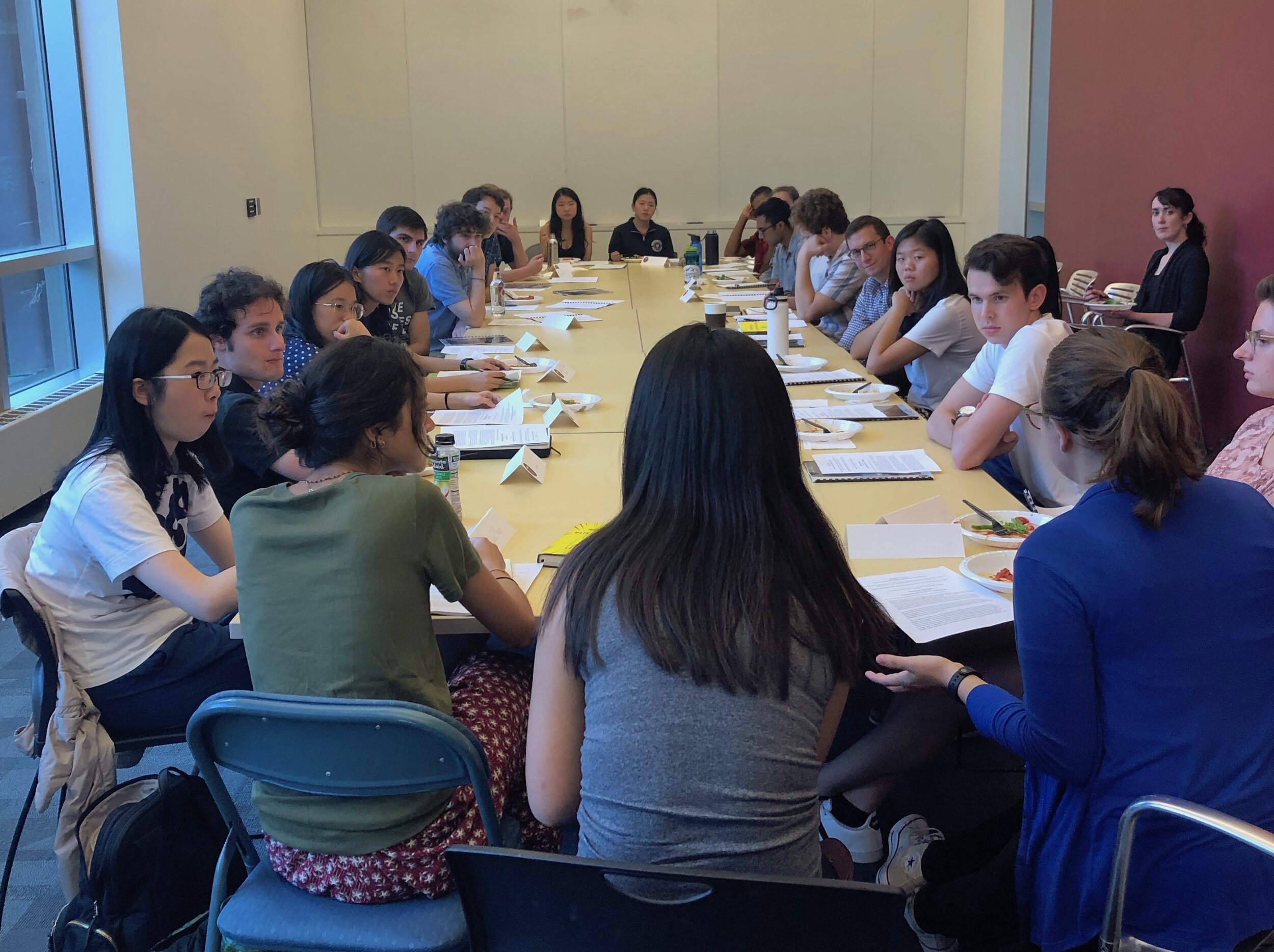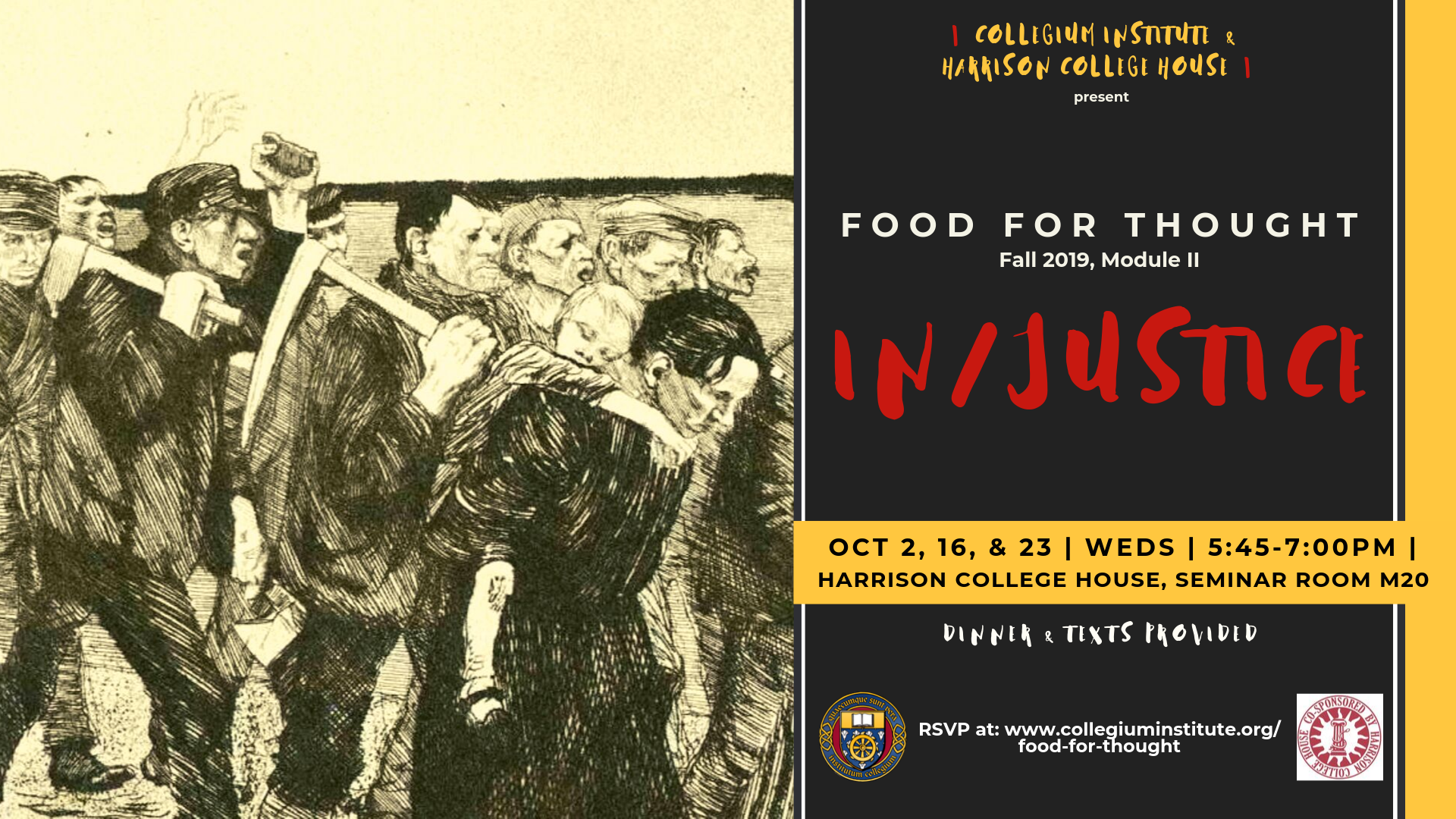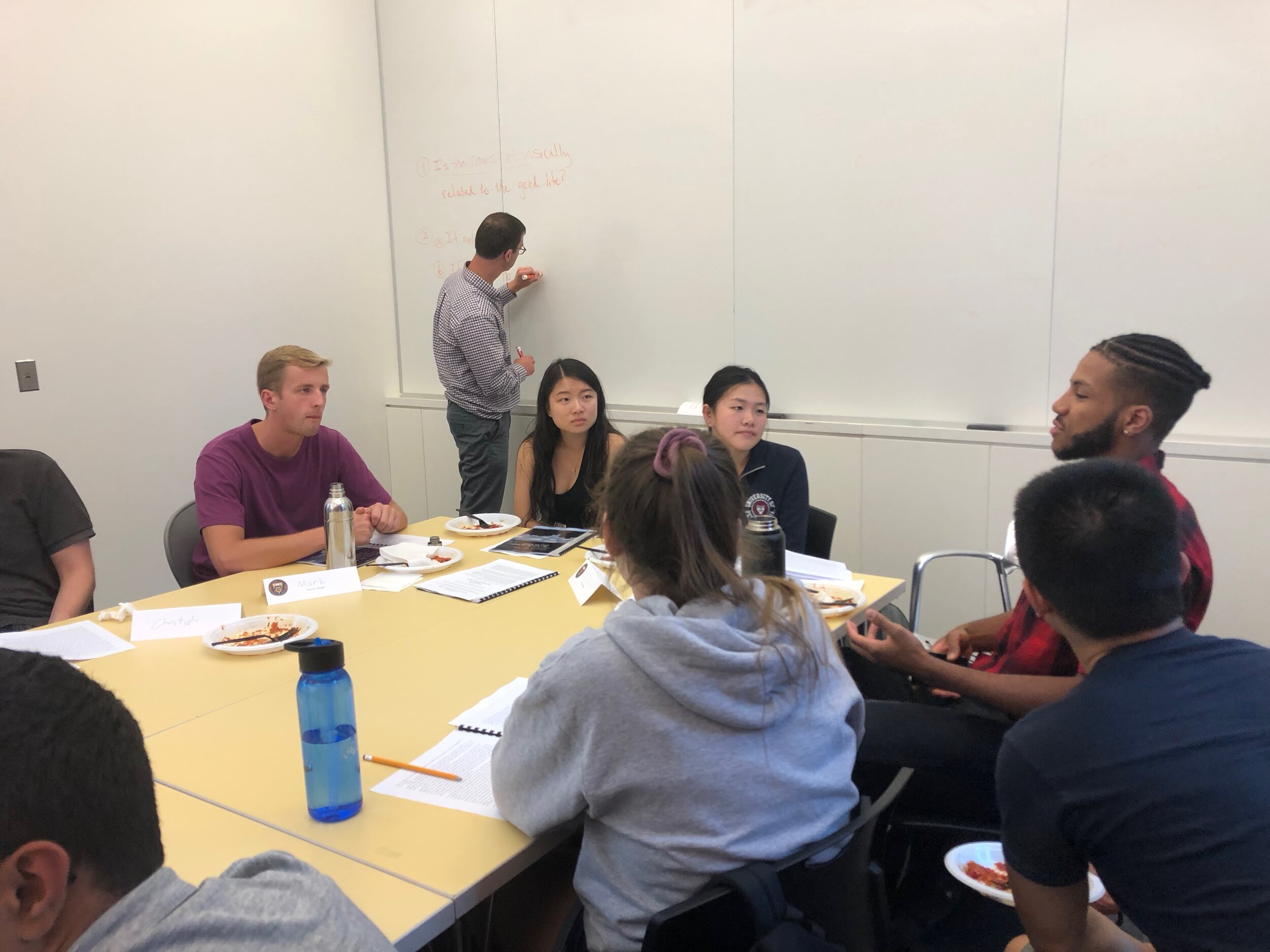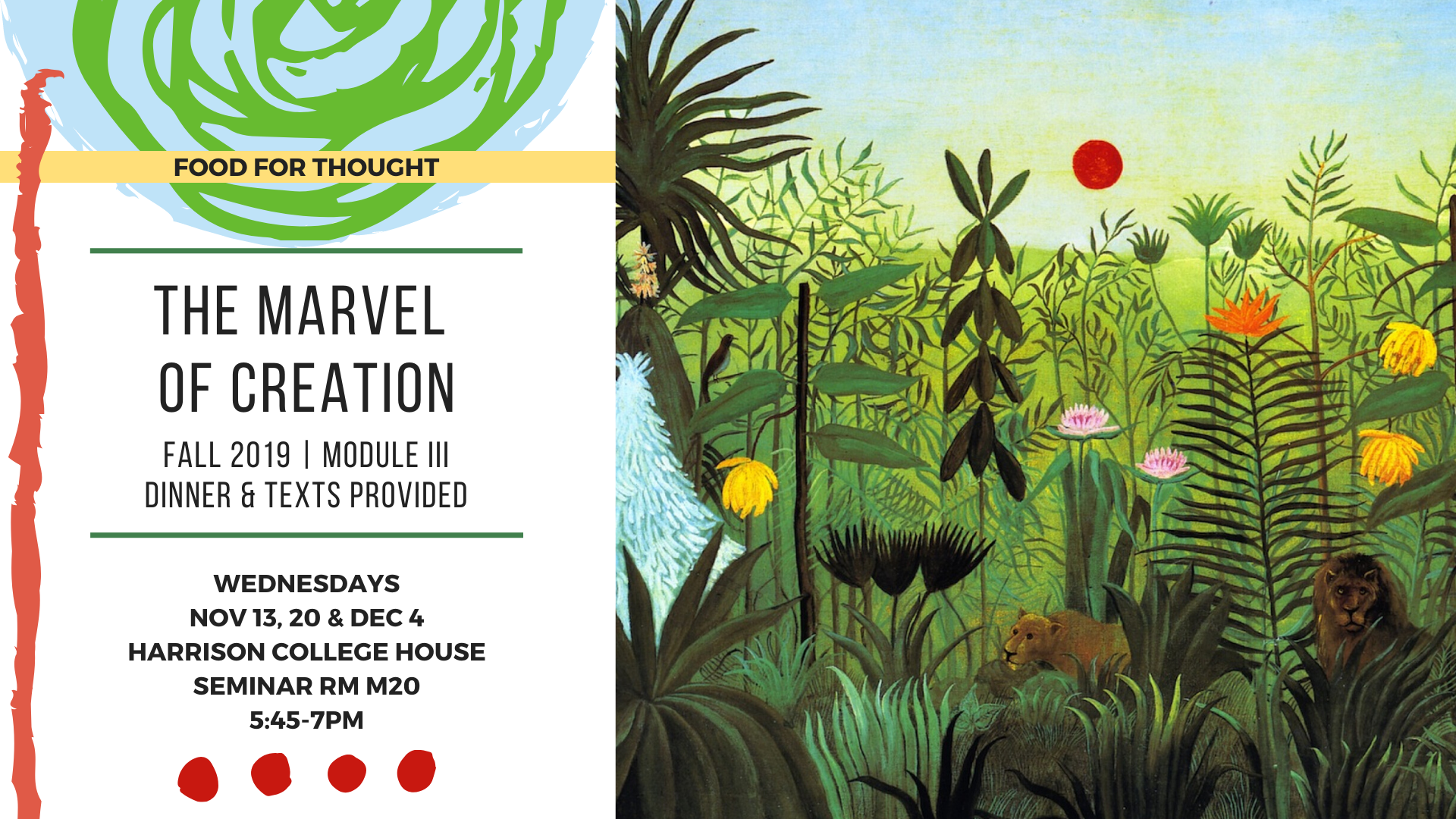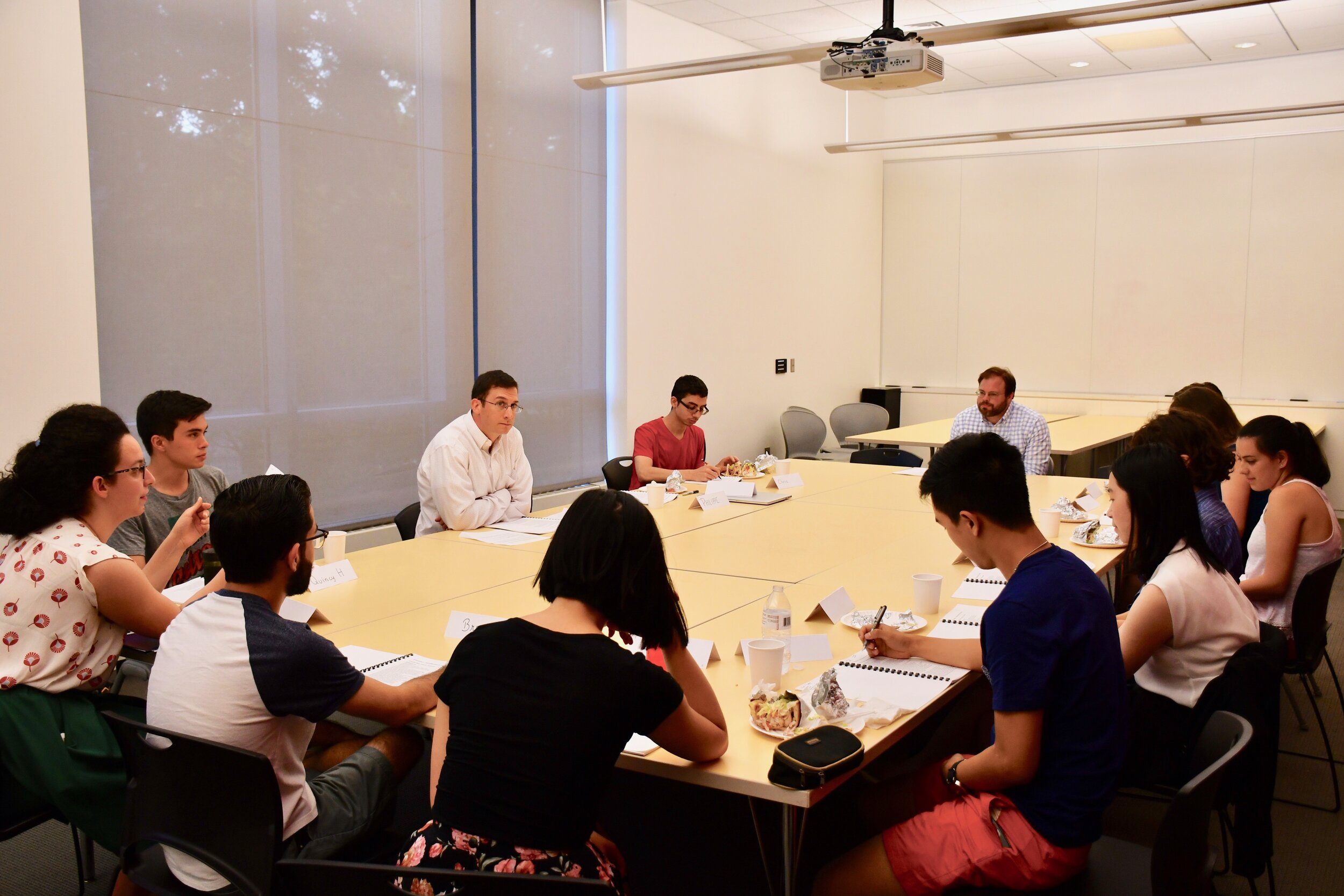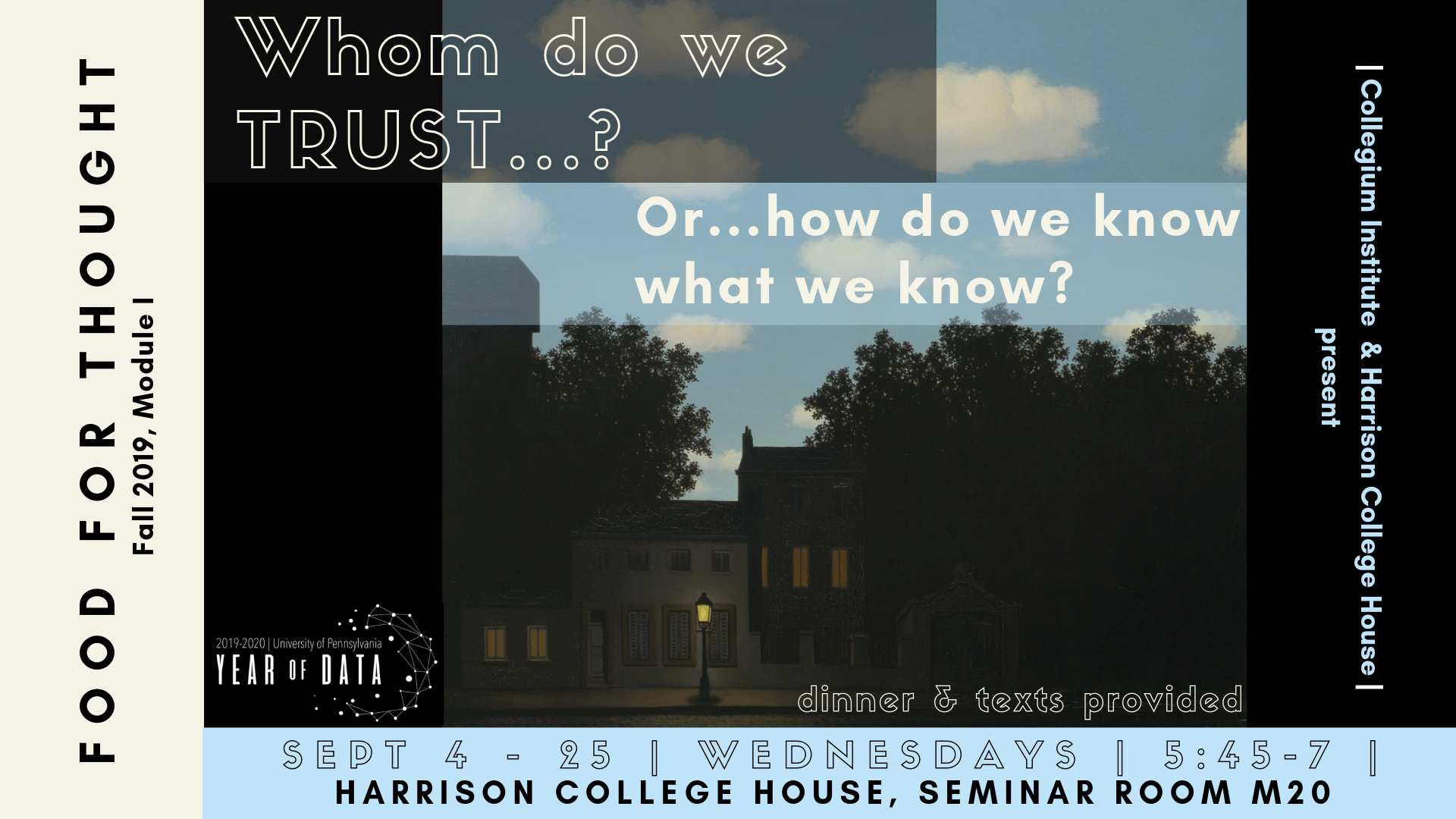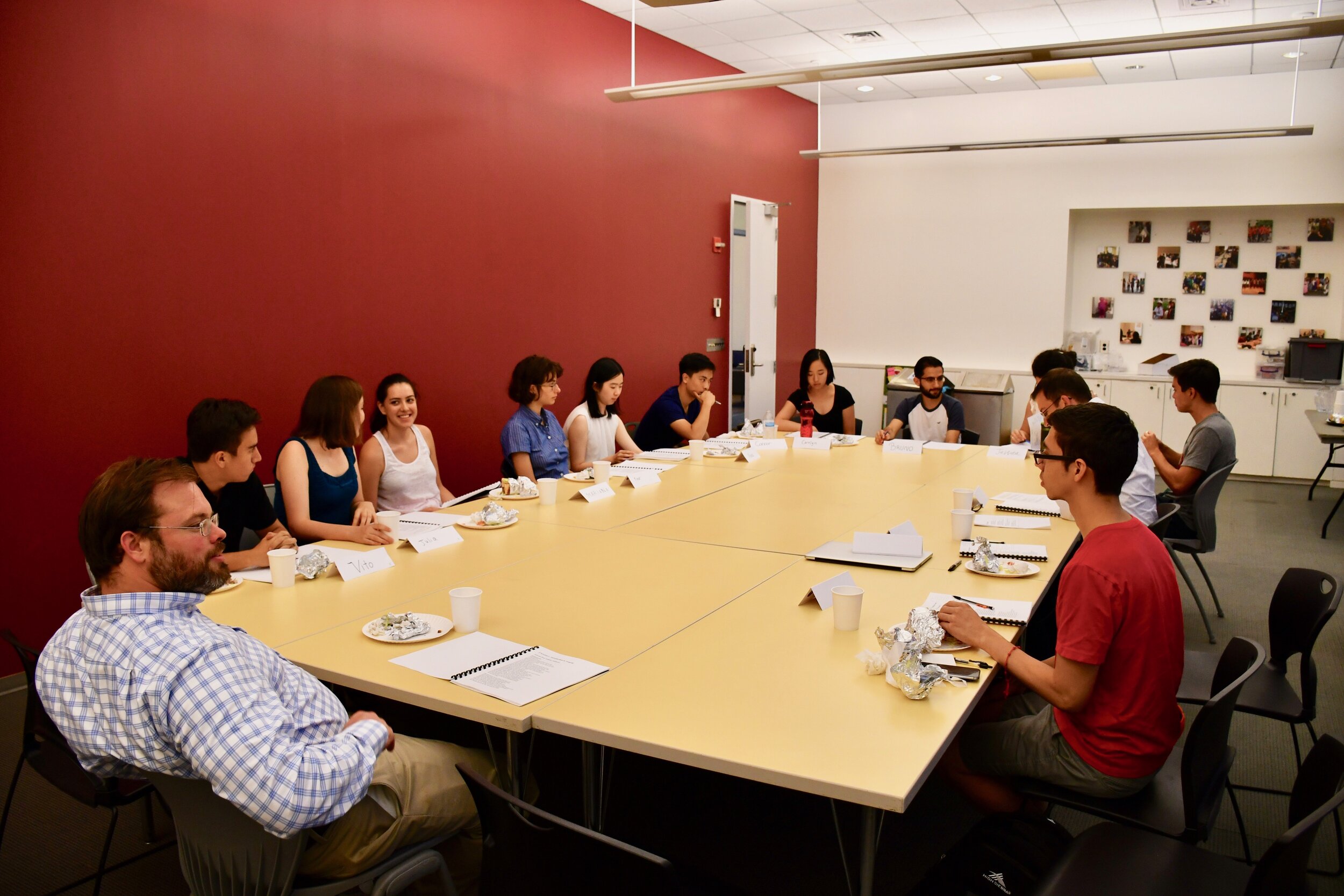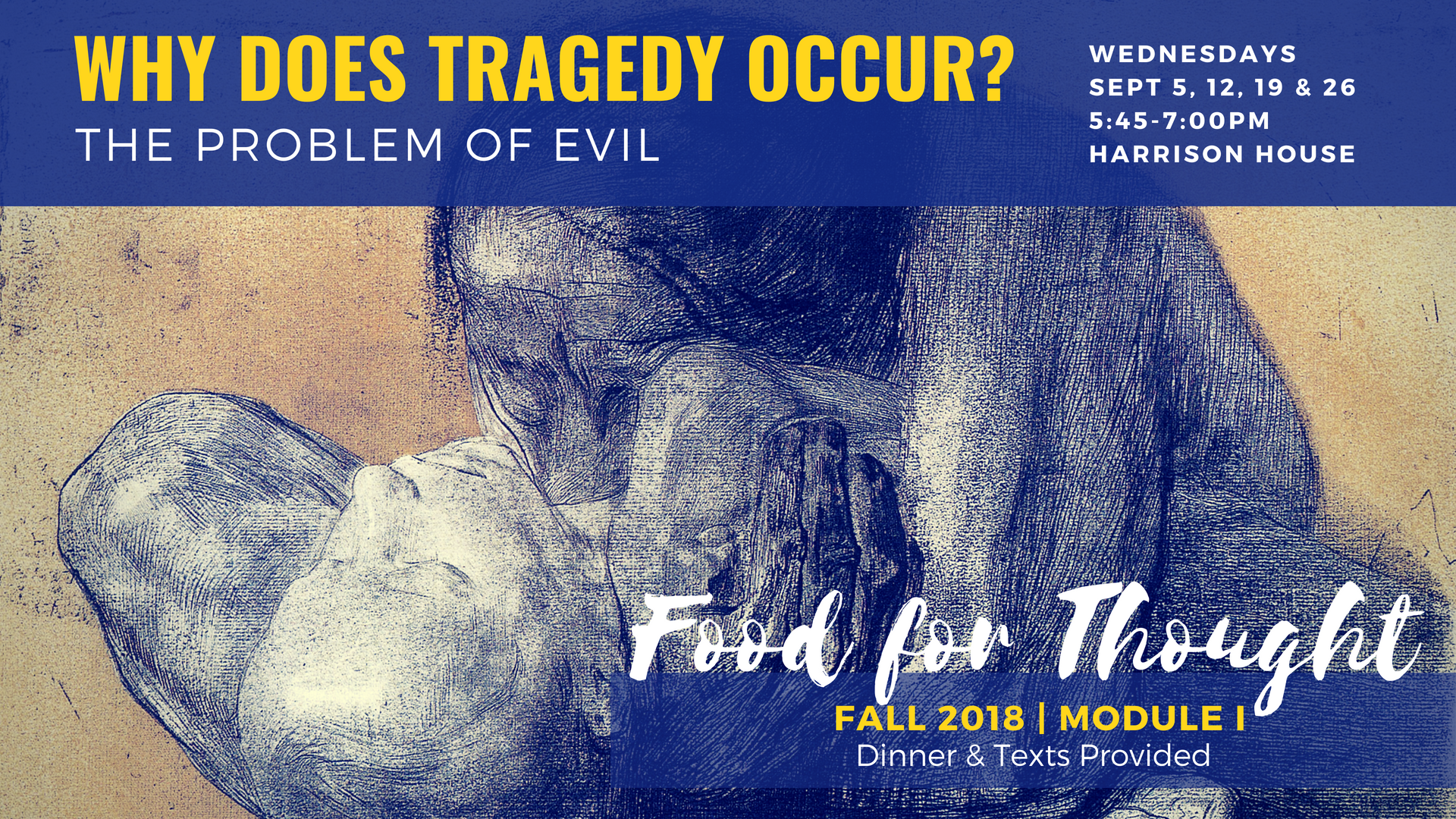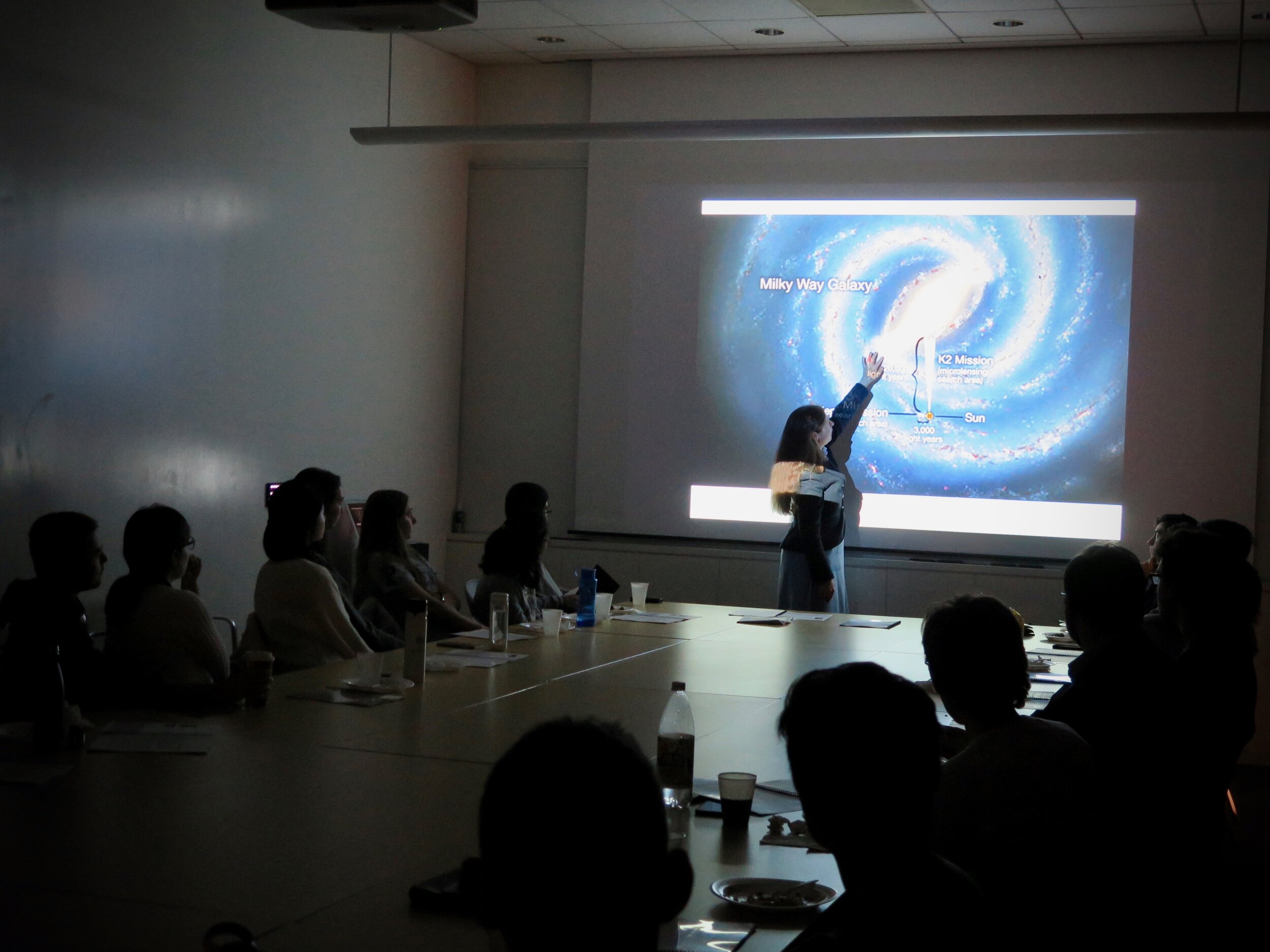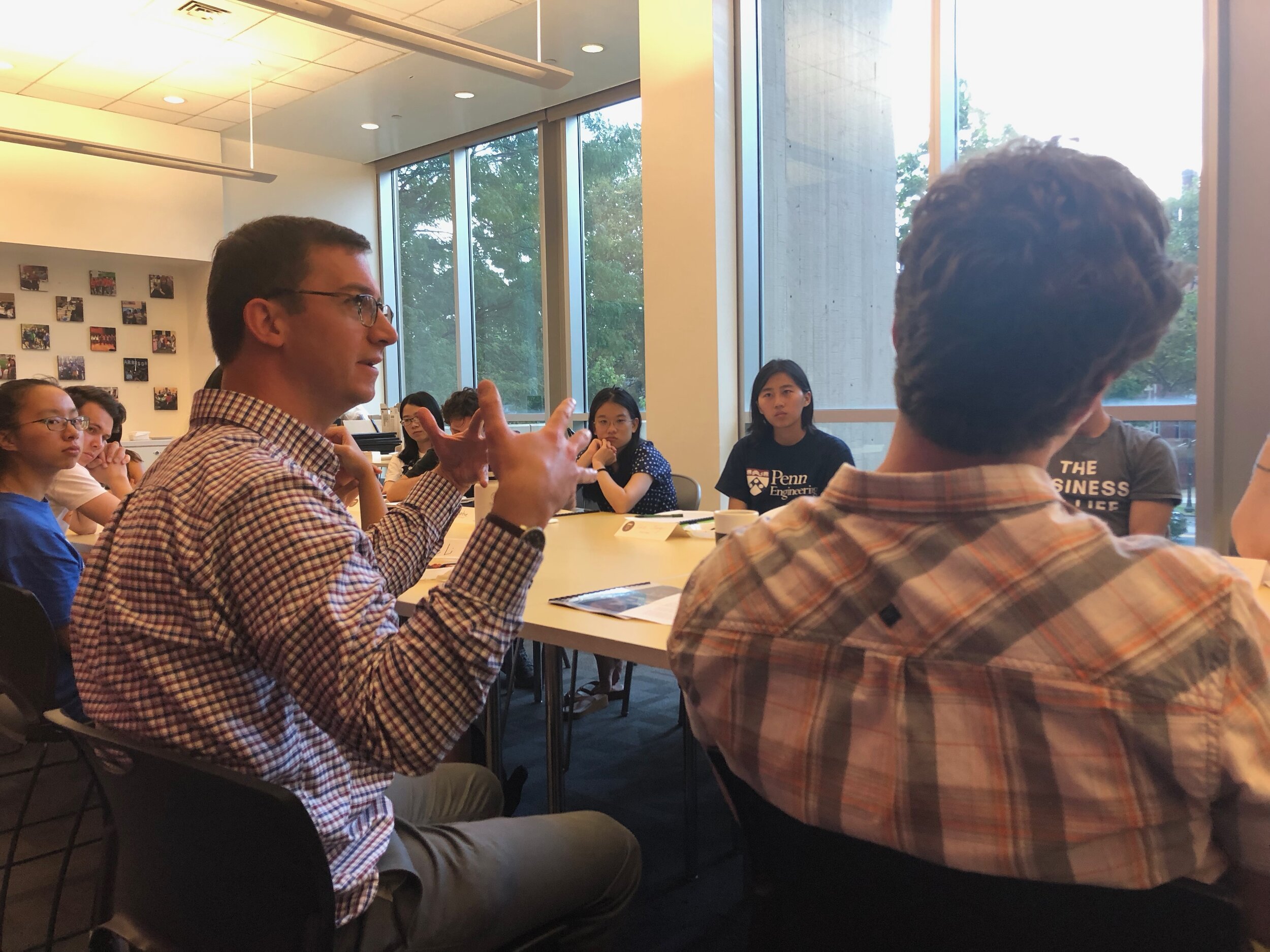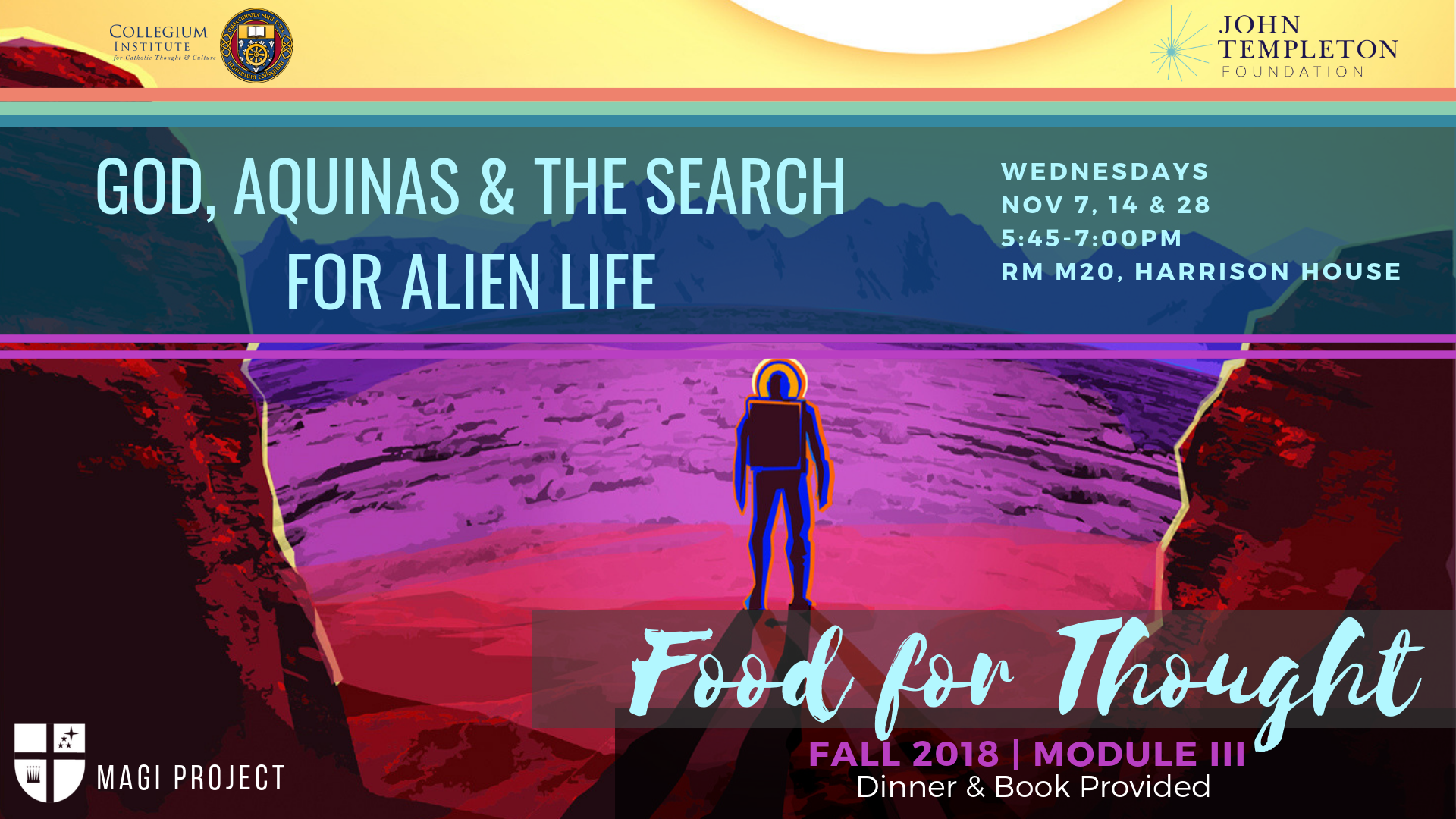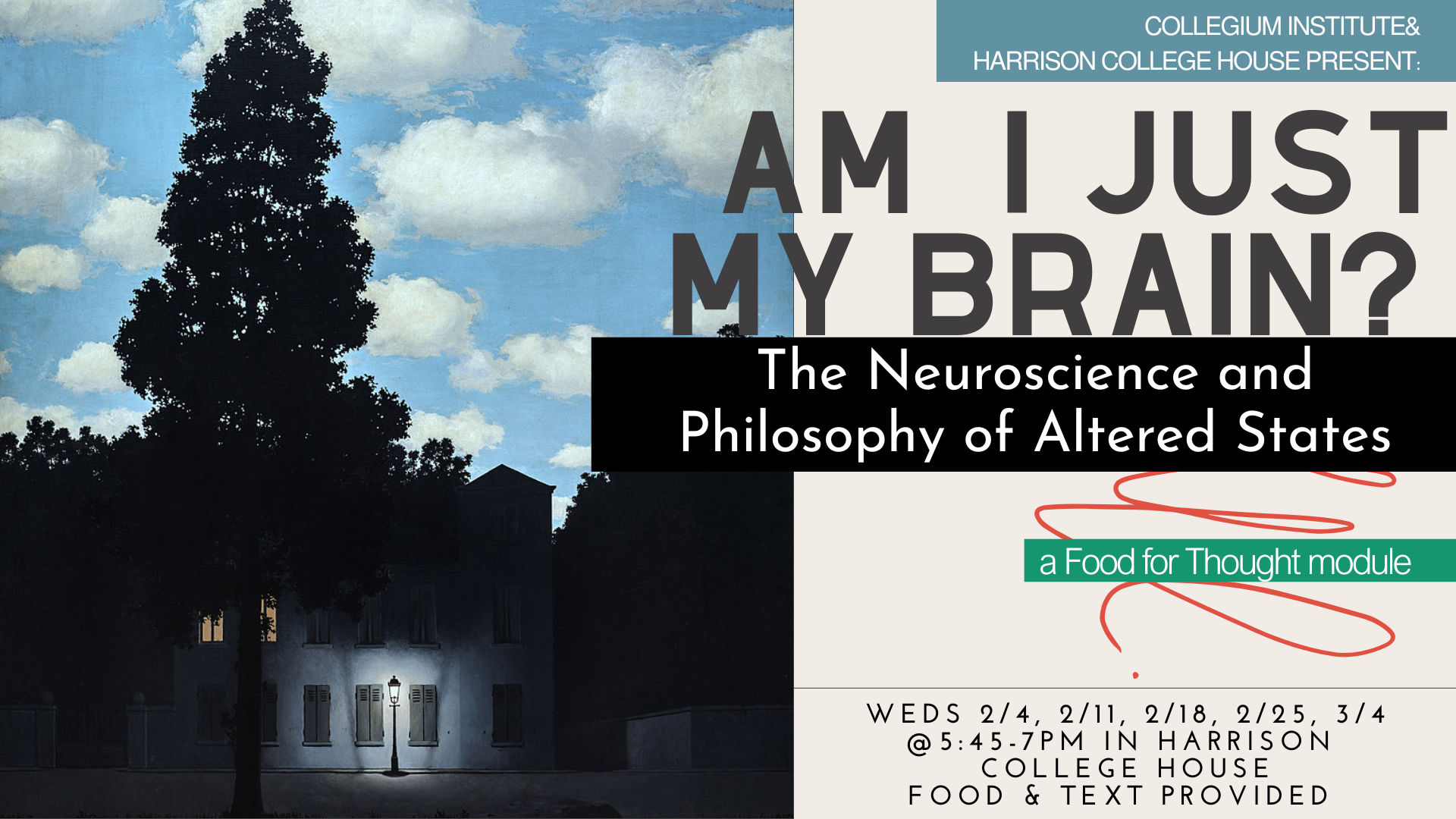
Food for Thought
Food for Thought (originally Coffee with the Classics) provides an opportunity to read and discuss some of the most influential and provocative thinkers of the past and present; from Augustine and Hannah Arendt to Montaigne, W.H Auden and Simone Weil. Our discussions are co-sponsored by Harrison College House, which provides the space and dinner for the seminar. Students are provided with a physical, bound reader for each module.
an informal dinner seminar where students engage fundamental questions in community without the stress of grades or papers.
Current Module
This series explores how contemporary neuroscience intersects with enduring philosophical and existential questions: What is a mind? What is consciousness? Are we free? What makes us human? Drawing on brain science, philosophy, and real world experience, we examine what neuroscience can and can’t tell us about meaning, reason, language, morality, and the self.
Fall 2025
Module II - We Built This City: Urbanization and its Discontents
“All cities are mad: but the madness is gallant. All cities are beautiful, but the beauty is grim.”
Den of iniquity. Concrete jungle. Human zoo. From Aristotle to Jay Z, the city has loomed large as a symbol of humanity’s worst tendencies and greatest potential. Today, more people than ever have left the figurative family farm for the bright lights of the bustling metropolis. It is therefore more important than ever to consider what impact urbanization has had on humanity: our communities, our values, our imaginations, and our senses of self.
In this Food For Thought season, we explored the city, both real and imagined. We discussed the power of urban metaphors, the good and bad temptations offered by the city, what it means to be an urban citizen, and how the cities of the future should look.
Module I - Sense and Sensibility: The Philosophy of Sight, Smell, Sound, Taste, and Touch
How much of life— and of history—is contingent upon the senses? A small taste of a madeleine cake inspired Marcel Proust’s sprawling seven-volume novel about the nature of memory. Places from the Spice Islands to India were conquered to give Europeans better access to fragrant cloves, cardamom, and nutmeg. The sound of trumpets might herald the start of the Apocalypse or the end of a military funeral.
In this Food For Thought season, we will explore the relationship between reality and the five senses. Join us on Wednesdays for dinner at Harrison College House as we evaluate the relationship between our vision and objectivity; taste, smell and memory; hearing and attention; touch and embodiment; and whether human beings can be said to have a sixth sense or more.
Spring 2025
Module IV - All the World’s a Stage: A Philosophy of Fame and Society
In an age where fame is at the fingertips of anyone with a Twitch account or Instagram page, the allure of the spotlight has never been more pervasive. But what does it really mean to be famous? Is celebrity a fleeting illusion, a social construct, or a reflection of deeper truths about our culture and ourselves?
Join us for this Food For Thought module as we explore the complex world of modern celebrity. We’ll unravel the myths and realities of fame, debate the degree to which those we elevate should reflect our values, and investigate how watching the stars affects our own sense of self.
Module III - Songs of Innocence: An Exploration of Childhood
Childhood, and how we conceive of it, has morphed and shifted over the millenia. Every culture and era has had a different conception of childhood, from the Ancient Romans to the late Medieval period, the Victorians and various hunter-gatherer societies and of course our own today, and everything in between. When does childhood end? Do college students deserve to be counted as children? In this Food for Thought, we explored questions surrounding children, including the nature of childhood, moral agency, rights, socialization, and education.
Fall 2024
Module II - Beasts of Burden? Rethinking Animals as Friends, Food, and Fellow Beings
Every day, we are surrounded by animals. You may have a dog at home on your bed, a chicken on your dinner plate, and a rabbit testing your medications and cosmetics. Humans, too, may have more in common with these creatures than we care to admit – we are “political animals” according to Aristotle, and “the beast with red cheeks” according to Nietzsche. So what are animals and how must we treat them? In this Food for Thought, we considered whether animals are only food or worth some thought. Join us as we explore humans as animals and animals as sustenance, tools, and reflections of ourselves.
Module I - They’re Out to Get You: The Epistemology of Conspiracy Theories
From Caesar’s assassination to Nero lighting the match to burn down Rome, conspiracies and conspiracy theories have been a mainstay in the cultural imagination. Some true, some false, some downright crazy, these plots and their plotters have captured our attention. Aside from our desire to suspect those in power or laugh at crazy theorists, conspiracies force us to consider important questions: how do we know what we think is true? In this Food for Thought, we explored conspiracies from all sides – the objects, subjects, believers, and consequences.
Spring 2024
Module VI - Hungry for Success: The Philosophy of Ambition, Ancient & Modern
In this Food for Thought module, join us on a thrilling exploration of ambition's philosophical roots, spanning from ancient to modern times. Is money or power the key to happiness? Will fickle chance bring you down? This seminar challenges participants to confront the timeless questions surrounding ambition's role in shaping human destiny.
Module V - Of Monsters and Men
In this Food for Thought module, join us as we go beyond the light of the campfire horror stories to explore the creatures waiting in the dark. How has our notion of monsters and the monstrous evolved? How has it stayed the same? What really makes something monstrous?
Module IV - Crazy in Love: Madness in Art and Romance
In this first Food for Thought module of the spring, join us try to understand insanity. Does love make us crazy? Are all geniuses a bit mad? Does madness bring us closer together or isolate us from others? Join us as we explore these questions and more in this seminar on madness.
Fall 2023
Module III: Apocalypse Then And Now
In this Food for Thought module, join us to explore what will happen at the end of the world. What can our imagined ends tell us about our purposive ends? Is the apocalypse a punishment or a natural consequence? Will life go on after the end and what will that life look like? Could we be heading for an apocalypse now?
Module II: The Power of Myth and Its Critics
In this Food for Thought module, join us to explore ancient myth: Can myths be true? What was their relationship to religion and ritual in the ancient world and how has that relationship evolved to the present? Might myths be necessary for community formation and survival even now? Join us as we reflect on the mythic tradition and its influence on us today.
Module I: Education in the Age of ChatGPT
In this first Food for Thought module of the year, join us to ponder the uncharted territories: Can computers ever replicate all that makes us human? Explore the virtues worth cultivating amidst automation, the skills that safeguard our uniqueness, and the collaborative realms where education propels human flourishing in synergy with technology.
Spring 2023
Module VI: Musings on Music
In this final Food for Thought module of the year, we will reconsider the significance of music. In what ways might it be necessary for culture? Does it have an intrinsic relationship to religion? How have various religions shaped it similarly and expressed it differently? What does music tell us about what it means to be human? Is music—or should music be—a central part of education? What does the music we make and enjoy tell us about our communities and ourselves?
Module V: On Eating
In this Food for Thought module, we will consider food and eating. Is eating well simply about physical nourishment? What does our approach to eating express about our understanding of our bodies and our relationship to the natural world? About our sense of personal identity or communal belonging? What are the ethical implications of our food choices? What can we learn from cultural and religious practices surrounding food?
Module IV: On Reading: Books and the Good Life
How are our cultural habits of reading changing as our textual mediums become increasingly digital? While we have a great wealth of information more easily available to us than ever, we seem to be losing our interest in (or perhaps even capacity for) engaging more than a few paragraphs of text. Are we also losing our ability to read deeply? Why should this matter?
In this series, we will consider the significance of reading. We will think about different ways of reading, asking what it means to read well and why we should bother to read at all.
Fall 2022
Module III: Home & Away
In this series, we will consider the meaning and importance of home. Beyond just the very real importance of shelter, home offers us our origin and end, the place from which we come and the place to which we seek to return. In this Food for Thought module, we considered the nature of home, journey and return while asking four essential questions: What is home for us? Why do we leave home? How do we make a home for others? And why do we long to return home?
Module II: Rituals of Truth
Ways of Knowing Across Disciplines
What does it mean to know something? How do the ways in which we are taught or the ways in which academic research is done influence and shape our knowledge? In this Food for Thought module, we will explore knowledge across disciplines-including what it means for something to be true in both the sciences and the humanities—and how the rituals of learning influence our understanding.
Module I: On Thinking
The Virtues and Vices of the Intellectual Life
This first Food For Thought module of the year explored the merits of the intellectual life and its relation to the active life. By discussing past and present texts and evaluating contemporary scenarios, we also will consider how to develop judgment for discerning between virtues and vices that so often mirror each other.
Spring 2022
Module V: The Springs of Comedy
Comedy has been a staple of western literature since antiquity and remains a mainstay of popular media. We engage with comedic entertainment so frequently, but what does comedy have to offer us regarding answers to the big questions about the nature of the world and our place within it? In this fifth installment of Food for Thought, we will engage with comedians, from the Greeks to Godot, in order to gain wisdom through levity.
Module IV: Sacred Stuff
Stuff is all around us: we place things on shelves, we gift things to those we love, we get rid of things, we collect things, we make things. We interact with so many material objects in our lives, from from explicitly holy objects to sentimental keepsakes, and to the ordinary items that fill our homes and shape our day-to-day activities. In this Food for Thought series, we explored our relationship to things—both mundane and holy—, memory, and the sacred.
Module III: Wellness and the Good Life
The concept of wellness is increasingly ubiquitous in contemporary culture and discourse, but what does it actually mean to be well? Collegium Institute’s first Food for Thought module of 2022, cosponsored by Penn's SNF Paideia Program invites students to take up this very question and explore the meaning of wellness and its relationship to the good life.
Fall 2021
Module II: Into the Afterlife: Dante at 700
In celebration of the 700th anniversary of Dante's death, this module invites students to join us on the great literary journeys through the afterlife. We will read excerpts from The Divine Comedy and other great texts on the afterlife, engaging with the great Tuscan poet's predecessors like Homer and Virgil as well as successors like Chaucer and T.S. Eliot. This module explores not only poetic answers to what happens after death, but also how truly great poems live on long after the deaths of the poets who sung them into being.
Module I: How to be a (Human) Student Again
As we return to campus this fall, this Food for Thought module explores the significance of in-person learning both in principle and in relation to pressing social issues that command our attention today. By chewing together on provocative texts of the past and present, we ultimately will consider the values and practices of becoming non-virtual human students again.
Spring 2021
Module VI: Philosophy of Time
In this series, we will take a look at this most elusive of philosophical subjects: time. While time seems so obvious and we so clearly dwell in time, it remains hard to pin down just what exactly time is and where time resides. We will consider a few options, particularly exploring whether time is best understood as an essential feature of the physical universe and so best numerically measured or whether time is best understood as a reality of our mind. When we think of time, are we physicists or students of the soul? In both scenarios, we will explore this as the ultimate question: ‘What should we do with the time that we have?’
Module V: The Poetic Imagination
Wonder, Truth, and the Everyday
Join Collegium Institute for a series of discussions exploring questions like: What does it mean to think imaginatively and live poetically? Can poetry help us access the truth in a way that is distinct from prose and other media? How ought we as readers—or hearers—encounter a poem? How familiar should we be with the “poetry of the page” to be able to appreciate the hidden verse of everyday life?
Module IV: Can the News Be Fixed?
Did the internet break the news or did it simply exacerbate pre-existing problems? Is it really even possible for ordinary citizens to be generally well-informed about current events? A series of discussions about how to read the news critically and how much attention we should be paying to the news in the first place, the first Food for Thought module of the Spring 2021 semester invites students to ask the question: Can the News Be Fixed?
Fall 2020
Module III: Choosing Free Will
Is free will a figment of our imagination? A neuroscientific mistake? Or a decision we make? Join us as we look at a few accounts of free will to see how free it is and why it matters. In this module, Choosing Free Will, will be looking at some contemporary scientific research on the question as well as some classic texts from philosophy. We'll report, but you will have to decide!
Module II: What Are the Social Sciences Good For?
This Food for Thought module, What Are the Social Sciences Good For? will challenge students to explore the unique strengths and limitations of social sciences when it comes to addressing the most fundamental human questions about truth and the good life.
Module I: Friendship in the Polis
In this year's first Food for Thought module entitled Friendship in the Polis, we will examine how best to navigate differences of opinion on truth, justice, and morality within a democratic polity. Over the course of four sessions drawing from great contemporary and ancient thinkers, we will weigh the merits of the idea that more than merely tolerating different opinions, we as citizens ought to develop and cultivate friendships with people who have opinions different from our own.
Click the button below to see even more previous modules.
